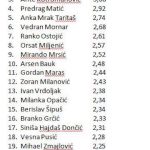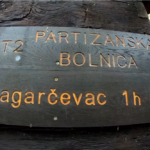The recent verdict of the Municipal Court in Šibenik in favour of Tomislav Horvatinčić, who stood accused of causing a maritime accident in 2011 that killed two people, led to a furious backlash in the Croatian public. Apart from setting a dangerous precedent to all future cases of similar nature where the defendants might now resort to a ‘syncope’ defence, the verdict caused a stir in relation to previous cases of such accidents.
Zadarski.hr brings a story of Ante Jureško, a 72 year-old resident of Mrljan on Pašman island who was accused of causing a maritime accident back in 1999. Unlike Horvatinčić, Jureško isn’t rich nor influential; he was pronounced guilty in 2011 and sentenced to 22 months in prison – by the same court that set Horvatinčić free.
“I’m angry, bitter. How is it possible for Horvatinčić to get such a verdict after everything that’s happened?! If only he got off on parole, but not like this, nothing. Even a dumb man could see what this trial was about, and we all wonder why no one believes in the Croatian justice system anymore. I haven’t believed in it for a long time”, Jureško said.
In 2011, Jureško was sentenced to 22 months in prison after he was pronounced guilty of an accident that led to the death of two crew members. Jureško was the owner and captain of ‘Borak’ ship; on the unfortunate occasion, the ship was transporting cement from Koromačno to Split and suffered a tragic outcome in a storm in the Šibenik archipelago. The court employed three expert witnesses, taking into consideration their opinion about the causes of the accident.
The verdict stated that Jureško, “as the person responsible, did not act according to technical regulations on safety measures and thus negligently caused danger to life and property, leading to the death of two individuals”. He was charged for committing a crime against general safety of people and property, as well as against traffic safety. It was concluded that the cargo in hold of the ship was improperly stored, so when it moved during the trip, it led to instability and sinking of the ship.
“Yes, I was on trial at the Municipal Court in Šibenik, just like Horvatinčić. My case was also about a maritime accident in which two men, my two seafarers, died. But unlike Horvatinčić, I was pronounced responsible, I was convicted and spent a year and ten months in Valtura prison in Pula. What he was able to get away with, I wasn’t”, said Jureško, explaining that he asked the court to allow another expert witness for maritime affairs to testify – the same one Horvatinčić asked for at his trial. “I wasn’t allowed [to do that], but Horvatinčić was. In my case, it still hasn’t been precisely and undoubtedly established what exactly happened with my ship. Even today, after I’ve already served my sentence, I claim that the ship simply cracked, that I wasn’t responsible for improperly stored cargo. Expert witnesses were saying ‘there was a possibility’, that ‘it could have happened’, but they were unable to prove it, and the ship remains sunk to this day. My demand to raise the ship from the sea in order to ascertain what exactly happened and in what way wasn’t approved, my proposal was rejected. A computer simulation that would prove how Borak sank wasn’t accepted either. I was practically convicted the moment I stepped into the courtroom, it was all opposite from the Horvatinčić case. Certain members of the court told me in private conversations that I shouldn’t have been convicted and that a claim of something ‘being possible’ cannot stand as evidence, but all in vain. I spent 22 months in prison because the court turned presumptions into facts”, said Jureško.
He also stated one of the judge’s colleagues asked for 20.000 euro in return for an absolving verdict, but Jureško turned down the proposal. “I used to transport building materials for that man, he has a summer estate on Capri. During the reading of the verdict, the judge said that I would have been granted a large insurance sum if I were released, which hints to a certain connection between the insurance company and someone from the court”, Jureško stated.
It’s hard to imagine the emotional and psychological impact that Horvatinčić’s verdict must have had on Jureško. He claims he still dreams about that night; after the ship had sunk, it took him two hours to swim to Obonjan island near Šibenik. “My son and one other sailor survived, as they held on to a wooden pallet that floated away. I can still see those images, I’m still haunted by them. I’m not guilty, which is why I filed a complaint at the Court of Human Rights in Strasbourg, but that has been pending for a year now as well”, Jureško concluded.









